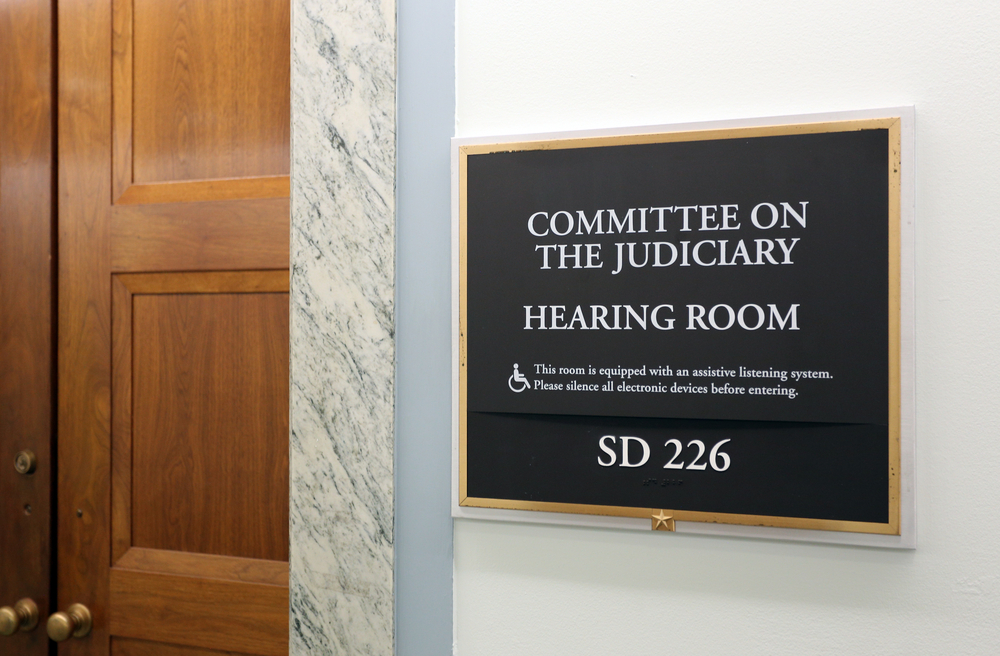GOP senators clash over ABA during hearing for judicial nominee rated 'not qualified'

Photo from Shutterstock.
Republican senators sparred over the ABA’s role in rating judicial nominees Wednesday during a Senate Judiciary Committee hearing for a lawyer rated “not qualified” by the ABA Standing Committee on the Federal Judiciary.
Sen. Mike Lee of Utah questioned the ABA’s role in the ratings process, while committee Chairman Lindsey Graham of South Carolina said he thinks the ABA evaluations are helpful, according to coverage of the hearing by Law360. Two other Republican senators also criticized the ratings.
The judicial nominee, Sarah Pitlyk, received the “not qualified” rating because she “does not have the requisite trial or litigation experience or its equivalent,” according to a letter to leaders of the Senate Judiciary Committee. The letter was written by William Hubbard, chair of the ABA Standing Committee on the Federal Judiciary. Hubbard is a former ABA president.
“Ms. Pitlyk’s experience to date has a very substantial gap, namely the absence of any trial or even real litigation experience,” the letter said. “Ms. Pitlyk has never tried a case as lead or co-counsel, whether civil or criminal. She has never examined a witness. Though Ms. Pitlyk has argued one case in a court of appeals, she has not taken a deposition. She has not argued any motion in a state or federal trial court. She has never picked a jury. She has never participated at any stage of a criminal matter.”
“While we respect the clerkship for which the nominee served after graduation from law school,” the letter says, “her legal practice to date does not compensate for the short time the nominee has actually practiced law and her lack of litigation, trial and courtroom experience.”
Pitlyk was a law clerk for Justice Brett Kavanaugh when he sat on the U.S. Court of Appeals for the D.C. Circuit. For the last two years, she worked as special counsel for the Thomas More Society, where she defended laws restricting abortions, report Courthouse News Service and Bloomberg Law. She is nominated for the U.S. District Court for the Eastern District of Missouri.
The ABA Standing Committee on the Federal Judiciary currently rates judicial nominees after their nominations have been publicly announced, the procedure that was also followed in the George W. Bush administration. Other presidents have given names of potential nominees to the committee for evaluation before making them public.
The ABA, which has been rating nominees since 1953, says its nonpartisan evaluations are based on three metrics: professional competence, integrity and judicial temperament. Of the 255 evaluations the standing committee has completed since Donald Trump became president, 97% of the nominees have been rated “qualified” or “well qualified.”
The evaluation begins when a lead evaluator for the standing committee receives the candidate’s completed Senate Judiciary Committee questionnaire and a waiver of confidentiality by the U.S. Justice Department. The evaluator reads the candidate’s legal writings; researches the person’s background; and conducts extensive, confidential interviews with colleagues. The evaluator also meets with the candidate and provides them an opportunity to respond to any adverse comments.
Lee isn’t satisfied with the ABA’s after-the-nomination evaluations of nominees, according to the coverage by Law360.
Lee alleged a “systemic political bias in the aggregate” in the ratings and questioned why the ABA has a role.
“Why? Why this organization, any more than any other organization?” Lee said. “Let’s review why it is that this organization and this organization alone seems to play a quasi-official role in the Senate Judiciary Committee hearings.”
But Graham said the evaluations are helpful to him and he wants the ABA to continue to provide input.
“The ABA is a fine group—more left than I am—but a lot of people in that organization, I trust their judgment, including Mr. Hubbard,” Graham said.
Graham said the ABA evaluation is “not a veto” and “we have a duty to make up our own minds.”
Another Republican senator, Ted Cruz of Texas, also criticized the ratings. “The ABA has a long and ridiculous record of behaving as a partisan mouthpiece when it comes to judicial nominations,” Cruz said.
A third Republican senator, Josh Hawley of Missouri, also criticized the ratings in an interview with Law360 after the hearing. “The problem with the ABA is that it’s an advocacy organization that’s given this privileged status as this reviewer of record,” Hawley said. “Frankly, there’s a lot of advocacy organizations out there. The ABA systematically leans left.”
Democratic Sen. Dianne Feinstein of California defended the ratings in an interview with Law360. “Why would you not want to know what the bar association thinks?” Feinstein said. “You can bring in others, that doesn’t bother me. The more the better. But I would be strongly opposed to removing the American Bar Association from making a recommendation.”
Related articles:
ABA Journal: “Its ratings system under fire, ABA stresses importance of federal judicial candidate evaluations”
ABA Journal: “President’s Message: ABA committee diligently and fairly evaluates credentials of federal judicial nominees”



